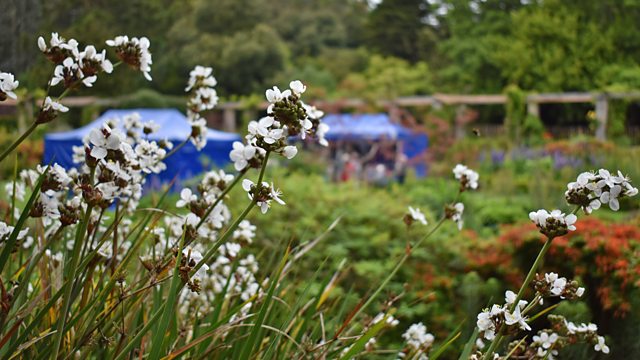Mount Stewart - The Potting Shed Sessions
Kathy Clugston presents the highlights from this year's Potting Shed Sessions.
Kathy Clugston presents the highlights from this year's Potting Shed Sessions. Bob Flowerdew, Matthew Pottage, Bunny Guinness, Neil Porteus, Matt Biggs, Pippa Greenwood, James Wong and Anne Swithinbank are answering the questions from this year's Summer Garden Party.
This week the panel answer questions on manure, how to get rid of black fly and cushion scale, and give recommendations on how to disguise a wall with plants, and good containers for a small pond.
Away from the questions, James Wong goes underground to meet Steven Dring of 'Growing Underground' in Clapham.
Produced by Hannah Newton
The Assistant Producer was Rosie Merotra
A Somethin' Else production for Â鶹ԼÅÄ Radio 4.
Last on
More episodes
Fact Sheet
Q1 – How do you grow trench celery from seed?
Ìý
Bob: I get celery from the supermarket, break the stems off and plant the crown, from which you can cut off the side shoots which is a lot easier than growing from seed. In a trench, you’d need it to be extremely rich, fertile – lots of humus. Watch out for the slugs too!
Ìý
Q2 – How do you get rid of black fly from my broad beans?
Ìý
Bunny: Once they start flowering, pinch out the tops – this will prevent black fly. Could also try jetting them off or spraying the plants lightly with an organic sticky spray which can be really effective.
Ìý
Q3 – I have a Christmas cactus which is very pot-bound; will I damage it if I take it out to split it?
Ìý
James: You won’t damage the cactus if you want to split it, but you probably won’t have to as they need a big water run and therefore are fine in smaller pots – being pot-bound will also encourage it to flower. If you did want to split them, plant them in a mixture of orchid bark and cacti compost.
Ìý
Q4 – What is the best poo to use in a mulch?
Ìý
Pippa: I use horse manure – it is variable so be sure to rot it down well, and I avoid pig manure – which is good for lighter soil. Generally, most manure will work well, but just make sure you rot it down well and bear in mind, manures have lots of nitrogen in them, which you may need to counteract with sulphated potash.
Ìý
Q5 – I have an aging Kerria japonica 8ft tall (2.4m), what can I do to rejuvenate it?
Ìý
Matt: Take out the older wood, make sure it’s well-fed, with liquid fertiliser at the base, and a little bit of mulch.
Ìý
Q6 – Can you suggest a small garden tree to plant on a bank which is 3-4ft (0.9-1.2m) high.
Ìý
Anne: Could get a multi-stemmed specimen – a birch or Tibetan cherry tree. Alternatively, Tilia henryana which is deciduous or if you want an evergreen, could try a bay.
Ìý
Q7 – Could you suggest some simple plants to grow which would attract bees, and potentially grow in hanging or potted baskets, and not in the ground.
Ìý
Bob: Bees have short tongues, so open flowers are best. Bees see blue best, so cup-shaped blue flowers – bell flowers (Campanulas). Or Cotoneaster.
Ìý
Q8 – Could you recommend a container for a small pond, and what could I grow in it?
Ìý
James: Old whiskey barrels, a terracotta pot without holes in the bottom. I would avoid anything zinc, as the heat may be damaging.
Plant Colocasia, Canna aquatica, miniature water lily like Pygmaea Helvola
Ìý
Q9 – Could you advise me on how to disguise a 12ft long (3.6m) wall which is 7/8ft high (***).
Ìý
Matthew: Cyanosis arboreus ‘Trewithan blue’, Clematis, Eccremocarpus, Ipomoea or Fatshedera.
Ìý
Q10 – I have a ‘Dublin bay’ climbing rose, but something is eating the leaves making them look like lace – the roses are unaffected – but I can’t find the culpit.
Ìý
Pippa: Could be a slug worm or a caterpillar. If you want to find the culprit, it usually happens at dusk, so sit out and watch. As the season progresses, the problem should decrease.
Ìý
Q11 – I have an infestation problem on my shrubs which is spreading through the garden.
Ìý
Matt: This is a Skimmia with a major infestation of cushion scale (Icerya purchasi). This generally wouldn’t kill the plant, and the best way to deal with it is physical removal; go through the plant and take out any dying/dead stems and blast it with a pressure washer.
Ìý
Q12 – My garden is full of slugs and I’m trying to solve the problem organically, but my neighbours aren’t; am I wasting my time?
Ìý
Bob: Nematodes. Or grow a tray of lettuces, Chinese cabbage or a Hosta in a pot, shred some of the leaves and put around any new plants you grow – this will feed the slugs before they can arrive at the new plant.
Broadcasts
- Fri 28 Jun 2019 15:00Â鶹ԼÅÄ Radio 4
- Sun 30 Jun 2019 14:00Â鶹ԼÅÄ Radio 4 FM
Six of GQT’s naughtiest gardening innuendos
When Gardeners' Question Time got mucky.
Podcast
-
![]()
Gardeners' Question Time
Horticultural programme featuring a group of gardening experts


